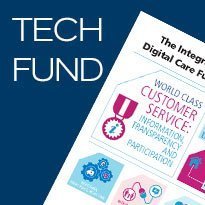NHS England has issued a ‘prospectus’ for the second round of tech fund money, which opens for applications today.
Both NHS organisations and local authorities can apply for part of the £240m being made available through what is now called the ‘Integrated Digital Care Fund’; with £160m available this financial year and £80m next.
Some £260m was available from the first round of what used to be called the ‘Safer Hospitals, Safer Wards: Technology Fund’, which was set up to support health secretary Jeremy Hunt’s call for a ‘paperless’ NHS by 2018.
Around £60m of this was not allocated – and has now been lost to the NHS – because of tight deadlines and Treasury demands for greater return on investment than some projects managed.
Trusts and local authorities will be up against another tight deadline this year, as bids must be in by 14 July.
However, the prospectus gives trusts more information about the application and award process than was available last year, and says that a ‘commercial and procurement toolkit’ has been created to support them.
As expected, the focus of this year’s funding round will improving the digital maturity of trusts – using the Clinical Digital Maturity Index developed by EHI Intelligence – and integrated working between health and social care.
The only class of systems named for special attention is e-prescribing; with a particular focus on paediatric e-prescribing.
There is also a sharper focus on standards, with the prospectus saying that both trusts and local authorities will be expected to use the NHS Number and Interoperability Toolkit standards, where these exist.
Applicants will also be expected to take note of NHS England policies on open application programming interfaces and its developing architecture for interoperability.
Beverley Bryant, the director of strategic systems and technology at NHS England, also stressed that projects needed to take account of the changing environment in which the NHS is working.
“Demands on healthcare are increasing and we need to be smarter in the way we deliver care,” she said. “Modern technology, when used well, provides a string to our bow that we didn’t have 20 years ago. We need to continue to embrace it as a great tool for patient care.”
The prospectus puts some restrictions on bids. Trusts will be expected to provide matching funding, as they were last year. But they will be limited to one individual and one joint application.
Trusts will not be allowed to bid for more money for projects that won last year, and they will not be able to get funding for projects that are being supported in other ways, for example through the remains of the National Programme for IT.
The prospectus also indicates that NHS England expects a return on its investment; it is looking for 1:1 for e-prescribing solutions, 1.5:1 for integrated digital care record solutions, and an overall return of 2.4:1.
The prospectus says that a small panel will review all the applications to make sure they meet they meet the criteria it sets out, and to make sure that matching funding is available. After that, applicants will be expected to attend a one-hour assessment interview in Leeds or London.
This will use assessment criteria developed with the University of Leeds to assess projects, and give them a red, amber, green status for project readiness.
Successful applicants will be expected to sign an award agreement setting out their obligations before they receive funding. This will include tracking and publicising benefits.
Hunt said in a statement: "Our ambition is to have a paperless NHS by 2018 and technology is playing a major role in helping to make that a reality.
"The Integrated Digital Care Fund will help replace outdated systems, allowing doctors, nurses and care staff to spend more time with patients and offer safer care."

